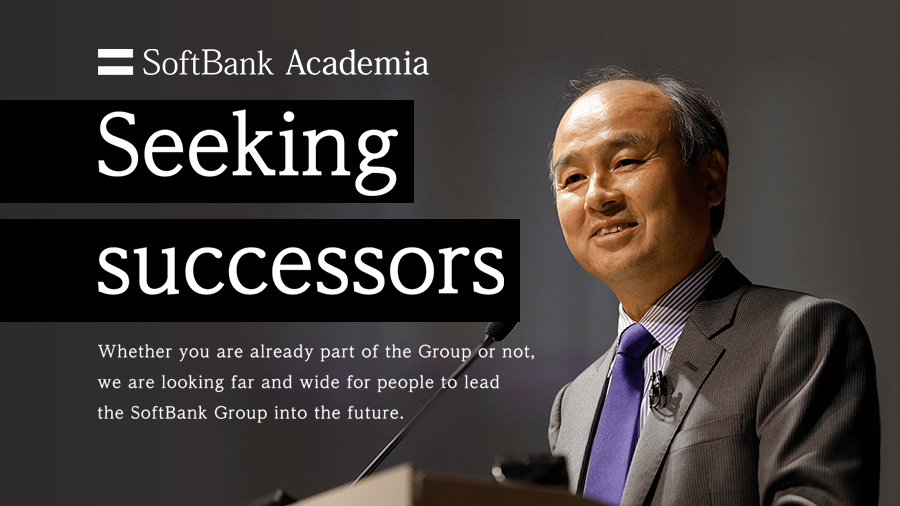Career Development and
Opportunities to Excel


Supporting employees
in developing their
own career path
We respect employee diversity
and aim
to develop human resources with great individuality

In September 2010, SoftBank Corp. established “SoftBank University (SBU)”, an evolved form of the existing core capability training, aiming to develop personnel who contribute to the realization of management goals.
SoftBank respects employee diversity and emphasizes independent career development by employees to realize the development of human resources with great individuality. Under this policy, “SoftBank University” provides an independent career development system which enables employees to independently select training subjects that match their career goals rather than a uniform, company-led career development and training system.
In addition to group training, SoftBank University also has realized a learning style that epitomizes SoftBank as a company with the full use of ICT to deliver e-learning courses that employees can complete on their computer, smartphone, tablet, or other similar devices, plus online interactive training in real time and even an archive of on-demand videos.
In the 2023 fiscal year, we offered not only tiered training programs tailored to positions and roles (such as new employee training and new manager training), but also 77 elective courses in business skills, English, and technology. These courses were provided in both group and online formats, with 6,156 employees (29% of all employees) participating.
We are also expanding our lineup with on-demand online courses and e-learning offerings.
Furthermore, with the aim of increasing the number of individuals who can utilize AI, we have been implementing the “AI Campus from SBU Tech” program since 2021, which systematizes AI-related learning content. This program includes support for learning the “G Certification” and “E Certification” conducted by the Japan Deep Learning Association, as well as hosting lectures by external experts.
| Average attendance hours for SBU training participants (FY2023) | Overall | Male | Female |
|---|---|---|---|
| Group Training & Lectures | 15.2 hours | 14.9 hours | 15.9 hours |
| Online courses | 12.1 hours | 12.2 hours | 11.5 hours |
| Support program for learning the “G Certification” and “E Certification” (FY2023) |
G Certification | E Certification |
|---|---|---|
| Number of Participants | 191 | 17 |
| Number of successful applicants for certification examinations* | 121 | 12 |
- [Note]
-
- *Total number of applicants for certification examinations as of March 31, 2023.
- *
Furthermore, in June 2009, SoftBank University introduced the Internally Certified Instructor (ICI) system to promote effective human resource development by transferring the know-how (wisdom, knowledge, and experience) of its employees. This system certifies employees with specific skills as instructors at SoftBank University, providing opportunities for employees to conduct training as instructors and for other employees to acquire higher skills through training tailored to their experience. As of March 2024, the number of ICI members is 100, and they are responsible for approximately 50 courses (about 81% of the total).
Proactively providing opportunities
to shape employees' careers
We provide a variety of opportunities in career development in an environment where employees can achieve self-growth and self-realization.
| Job posting (Internal recruiting system) |
An internal recruiting system for starting up new business lines which provides opportunities for employees to grow and express themselves and establishes a challenging work environment. |
|---|---|
| Free-agent system (internal transfer system) |
The free-agent system enables ambitious employees to challenge themselves to boost their careers. Employees can specify a department or a group company they would like to join and apply. |
| Support system for advancement of employee qualifications | The company supports employees seeking to advance their qualifications (with approval from the company) through reimbursement of tuition or examination fees. |
| Self reporting | Employees submit a report once annually that self-assesses current job fitness. At this time, employees can also request a specific job assignment and speak with their supervisors. This process enables the company to match the right individual with the right job and construct the best career path for each individual. |
| Skill development goals | We support employees' skill development in conjunction with training programs by having them assess their own abilities, and then having them create and implement their own skill development goals once a half year. The objectives set are managed within the contribution evaluation system, and we have ongoing conversations throughout the year to check the achievement and provide feedback. |
| SB Career Dock | In order for employees to take a positive step toward their future careers, we host seminars and lectures for different age groups, group learning, and e-learning, etc. to provide regular opportunities for employees to review their own abilities and skills. |
| Managerial Survey | Once a year, we conduct a survey targeting managerial staff. The results of multidimensional appraisals (supervisors, colleagues, subordinates/members, and the individual) not only confirm the differences in perception between the surroundings and oneself, and set, execute, and reflect on issues to improve management skills, including overcoming areas for improvement, but also identify trends in job suitability and behavioral characteristics, which can be used as reference for assigning and assigning management positions. |
Grade, Evaluation, Remuneration Systems
Evaluations and remuneration are based on fair and just frameworks that enable people who demonstrate results through their efforts and to be able to take on the next challenge.
| Mission Grade System | Fields and grades are decided according to the individual's mission and workstyle, rather than personal attributes such as age or gender. Mission statements are set for each position: Directions for challenges are presented by clarifying the mission that the company expects of the employee, and clearly defining the skills to be demonstrated. |
|---|---|
| Evaluation System | SoftBank has adopted a number of evaluation, indexes, including: Contribution evaluation (twice/year), which recognize work achievements and contributions to the organization; Mission evaluations (once/year), which recognize individual missions and abilities; the core competency and value evaluation (once/year) required to perform evaluations for all full-time employee to carry out those missions. In the Contribution evaluation, we set individual goals while breaking down organizational objectives, and evaluate the degree of goal achievement and contribution to the organization. We recommend regular meetings (approximately once a month) with supervisors to have conversation about the progress of these goals. In the mission evaluation, based on the mission definition that outlines the expected roles for grade according to job categories, we evaluate individuals considering their overall capabilities and determine their grade for the next year. In the core competency and value evaluation, we assess various aspects such as strategic thinking, tactical planning, decision-making, execution, as well as integrity, ethics, and self-management, including compliance with Code of Conduct and take into account these evaluations in the mission evaluation process. |
| Remuneration System | The remuneration system is linked to the Mission grade system and the evaluation system (Contribution evaluation/Mission evaluation/The core competency and value evaluation). Bonuses are tied into the individual's contribution evaluations, and flexibility is maintained so that remuneration can be paid in keeping with contributions to the organization. |
| Others | We issue stock options as a long-term incentive aimed at further enhancing the motivation and morale of our group's employees to improve corporate value. Stock options are a measure that links the company's performance and the improvement of corporate value to the benefits of employees. Stock options were issued to all employees in March 2018 and January 2021. |
In the fiscal year 2025 (our business year from April 1, 2025 to March 31, 2026), we commit to achieving an average recipient's remuneration increase of at least 3% compared to the previous year.
We will promptly report if the announced wage increase is not implemented as planned.
Award systems
We have established an award system to motivate employees and foster a spirit of challenge.
| SoftBank Award | With “Challenge” and “Innovation” as keywords, the award recognizes not only sales and profits, but also the contributions of teams and individuals for their challenging and creative efforts. By recognizing and praising such efforts among each other, we achieve motivation enhancement and foster a spirit of challenge among employees. |
|---|---|
| Team-based Profit Management | This is an award system targeting sales departments, aiming to encourage the smallest sales organizational units (departments, divisions, and teams) to proactively work on improving profits with a sense of ownership. The results of each team are evaluated semiannually, and the top-ranking teams are awarded a team bonus as a reward. |
Engagement Survey
To further promote work-life integration, workplace revitalization, and increased employee engagement, we have revamped our annual Employee Satisfaction Survey (ES Survey) and monthly Pulse Surveys into a unified “Engagement Survey” starting in August 2023. The annual survey is conducted every August, while the monthly surveys are conducted with fewer questions during the remaining months.
The annual survey aims to understand the current situation and identify issues for building a stronger and more revitalized organization, with a target of achieving an “overall score of 65 or above.” We analyze the results and actual conditions at both the company-wide and departmental levels and develop action plans accordingly. This process leads to continuous improvement activities for creating a better organization and ensures that these improvement efforts are disseminated and embedded throughout the organization.
The monthly pulse survey is conducted for checking the individual status and promoting communication between superiors and members. It promotes better communication by measuring changes in one's condition and disclosing the results to superiors.
At SoftBank Corp. employee satisfaction surveys and pulse surveys are treated as risk assessments. By understanding the risks related to securing human resources based on these results, we link them to the vitality of employees, the improvement of company performance, and the retention of excellent human resources who support the sustainable growth of our business.
| Employee Satisfaction Survey | FY2020 | FY2021 | FY2022 | FY2023 | ||
|---|---|---|---|---|---|---|
| Response Rate | 96.8% | 96.4% | 96.3% | 99.0% | ||
| Overall satisfaction* | Company-wide Average | 3.58 | 3.63 | 3.62 (61) |
66 | |
| Gender | Average Male | 3.59 | 3.63 | 3.63 (61) |
66 | |
| Average Female | 3.57 | 3.63 | 3.63 (61) |
65 | ||
| Category | Work Average | 3.46 | 3.46 | 3.48 | 61 | |
| Senior Colleague Average | 3.80 | 3.84 | 3.86 | 71 | ||
| Workplace Average | 3.66 | 3.71 | 3.72 | 68 | ||
| Company Average | 3.40 | 3.50 | 3.44 | 64 | ||
- [Notes]
-
- *Totaled on a 100-point scale (up to 49: Low, 50-64: General, 65-74: High, 75 or above: Very High)
Scored on a 5-point scale (Up to 3.00: Low, 3.00-3.50: General, 3.50-4.00: High, 4.00 or above: Very High) - *Overall satisfaction: Aggregated value of results related to work / workplace / senior colleague / company
Work: Items related to job satisfaction, purposefulness and stress such as “fulfillment,” “proactiveness,” and “workload”.
Workplace: Items related to the workplace environment, such as “mutual support” and “relationships”.
Senior Colleague: Items related to senior colleagues in management, such as “understanding abilities” and “work assignments”.
Company: Items related to the company, such as internal systems and welfare programs, including “evaluation and remuneration” and “culture and climate”.
- *
In-house Entrepreneurship Program
Since 2011, we have been implementing an internal startup program called “SoftBank InnoVenture” to support employees in realizing their new business proposals. This program aims to broadly solicit new business ideas that will contribute to achieving the “5,000 Strategic Synergy Group Companies” outlined in the “SoftBank New 30-Year Vision.” As a result, we have been receiving a continuous stream of highly original and innovative ideas that contribute to the further advancement of the SoftBank Group.
Since the start of SoftBank Innoventure in 2011, we have received approximately 7,840 applications for business ideas, and 112 of them have passed our rigorous screening process and have been released as beta products. Of these 22 have been commercialized (as of May 2024).
Additionally, as Innoventure Lab, we offer an incubation program for SoftBank Group employees, supporting them from the initial application stage to the final review of new business ventures. Launched in 2016, this program operates outside regular working hours and aims to provide a wide range of knowledge and practical experience related to domestic and international startups, new business development strategies, and hypothesis testing methods. Registration is open to all SoftBank Group employees and prospective employees who aspire to engage in internal entrepreneurship. (14.2% of consolidated employees participated)
An educational program
to identify and foster
potential successors
Following the announcement of SoftBank's Next 30-Year Vision, Masayoshi Son launched SoftBank Academia on July 28, 2010 with the goal of identifying and educating potential successors.
In addition to lecture courses taught by Mr. Son in his capacity as founding principal, the program includes opportunities for participants to develop practical skills and provide mutual feedback. Furthermore, the presentation program, which allows participants to propose concrete business strategies and plans for the SoftBank Group, is held once or twice every two to three months, offering opportunities to present directly to the management team.
The program is not exclusive to SoftBank employees, and has been openly accepting students from outside the SoftBank Group since June 2011. Students admitted to the program are selected through a rigorous screening process designed to highlight highly motivated individuals with diverse backgrounds who are eager to inspire and be inspired, and who have the potential to lead the SoftBank Group. (Approximately 300 enrolled Academia students and 0.3% of the consolidated workforce are internal students)
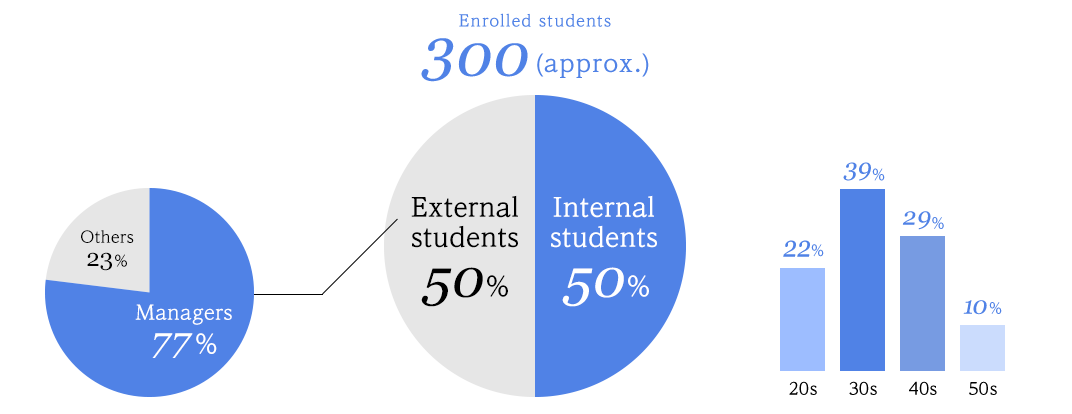
External student attributes
(the remainder: engineers, researchers,
academics, university students, etc.)
Proportion of internal and
external students
(External students: External students are those
who do not work for SoftBank Group or
any of its Group companies.)
Age range
(as of April 1, 2024)
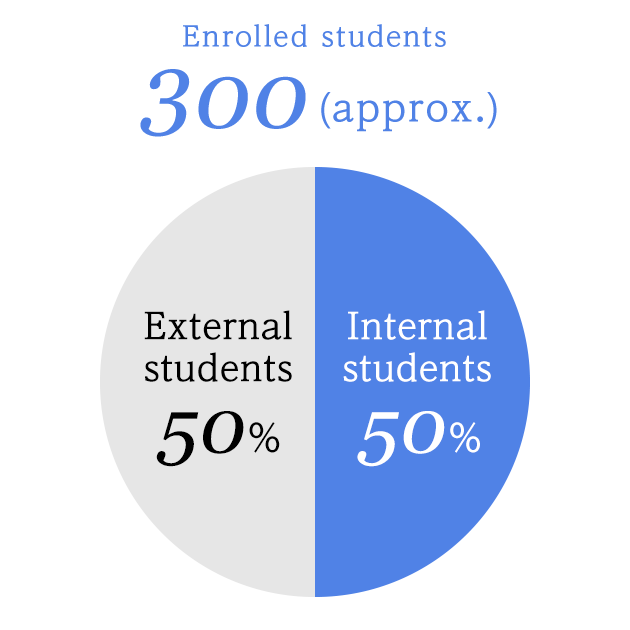
Proportion of internal and
external students
(External students:
External students are those
who do not work for SoftBank Group or
any of its Group companies.)
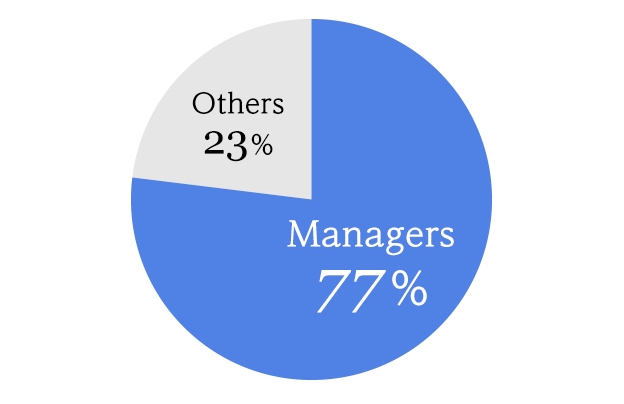
External student attributes
(the remainder: engineers, researchers,
academics, university students, etc.)
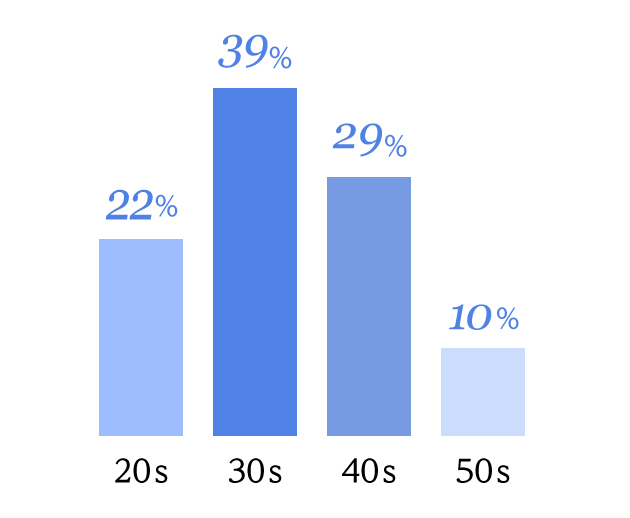
Age range
(as of April 1, 2024)

